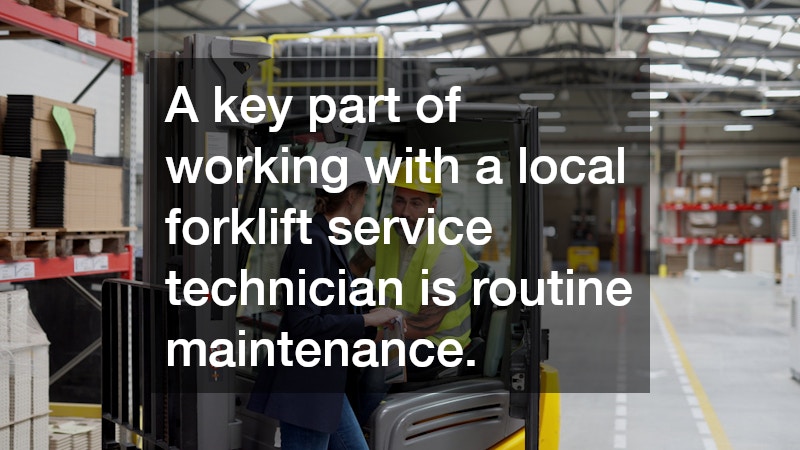Forklifts are essential equipment for many warehouses, construction sites, and manufacturing facilities. Ensuring that they operate safely and efficiently is critical to maintaining productivity and preventing accidents. This is where a local forklift service technician becomes invaluable. These professionals specialize in inspecting, repairing, and maintaining forklifts to keep operations running smoothly.
Understanding what to expect when working with a local technician can save time, reduce downtime, and protect your investment.
Initial Assessment and Inspection
When you schedule a local forklift service, the technician will begin with a thorough assessment of your equipment. This involves a detailed inspection of the forklift’s key systems, including the hydraulic components, engine, transmission, brakes, and electrical systems. The technician may also check the mast, forks, and tires to identify wear or damage.
This initial evaluation allows the technician to determine whether routine maintenance is sufficient or if more extensive repairs are needed. A professional inspection not only identifies current problems but can also prevent future issues, ensuring that your forklift remains safe and operational.
Transparent Communication and Reporting
One of the hallmarks of a reliable local forklift service is clear communication. After completing the inspection, the technician will provide a detailed report outlining their findings. This report typically includes a list of required repairs, recommended maintenance, estimated costs, and the expected time frame for completing the work.
Transparency at this stage is critical. A trustworthy technician will explain the technical issues in simple terms so you can make informed decisions about what services are necessary. If optional upgrades or preventive maintenance are recommended, they will provide a clear explanation of the benefits and costs associated with each option.
Routine Maintenance Services
A key part of working with a local forklift service technician is routine maintenance. This includes oil changes, hydraulic fluid checks, battery inspections, and lubrication of moving parts. Regular maintenance prevents equipment breakdowns, extends the lifespan of your forklift, and ensures compliance with workplace safety regulations.
Technicians may also perform tire inspections and replacements, check for fluid leaks, and test safety features such as horn, lights, and backup alarms. A proactive maintenance schedule reduces the risk of costly emergency repairs and minimizes downtime in your operations.
On-Site Repairs and Troubleshooting
Sometimes forklifts require immediate attention due to unexpected malfunctions or accidents. Local forklift service technicians are often able to perform on-site repairs, minimizing the need to transport heavy equipment to a service center.
Common issues addressed on-site include hydraulic leaks, transmission problems, electrical malfunctions, and brake adjustments. Experienced technicians bring specialized tools and replacement parts to ensure repairs are completed efficiently. On-site troubleshooting not only saves time but also allows the technician to observe the forklift in its working environment, which can provide valuable insights into the root cause of issues.
Specialized Expertise
Working with a local forklift service technician means benefiting from specialized expertise. These professionals are trained to handle a variety of forklift models and types, including electric, propane, and diesel-powered units. Their knowledge extends beyond basic repairs to include advanced diagnostics, component rebuilds, and preventive care strategies.
Having access to a skilled technician ensures that even complex problems are addressed correctly the first time. This expertise minimizes the risk of recurring issues and protects the overall integrity of your equipment.
Safety and Compliance
Safety is a top priority when operating forklifts. A qualified technician not only repairs your equipment but also ensures it meets all safety and compliance standards. They check critical safety components, perform load tests, and verify that operational systems are functioning properly.
Regular servicing helps prevent accidents and workplace injuries, protecting both your employees and your business. In addition, many technicians keep detailed service records, which can be useful for audits, insurance claims, and warranty documentation.
Long-Term Benefits
Regularly working with a local forklift service technician provides long-term advantages for your business. Well-maintained forklifts are more reliable, efficient, and safe. Proper servicing reduces operating costs over time by preventing major repairs, extending the life of your equipment, and improving fuel efficiency for diesel or propane units.
Additionally, a strong relationship with a local technician ensures personalized service tailored to your specific fleet. They become familiar with your equipment, operational environment, and maintenance history, enabling faster diagnostics and more accurate recommendations for future repairs or upgrades.
Collaborating with a local forklift service technician is an investment in the safety, efficiency, and longevity of your equipment. From comprehensive inspections and routine maintenance to on-site repairs and safety compliance, these professionals provide essential support that keeps operations running smoothly.
Clear communication, specialized expertise, and quick emergency response are key aspects to expect when hiring a local technician. By prioritizing regular service and establishing a trusted relationship with your technician, you can reduce downtime, lower operating costs, and ensure your forklifts remain safe and reliable.
Whether you’re managing a single forklift or an entire fleet, working with a skilled local technician ensures your equipment is in capable hands, helping your business maintain productivity and meet operational goals. The investment in professional local forklift service pays off through enhanced performance, safety, and peace of mind.



